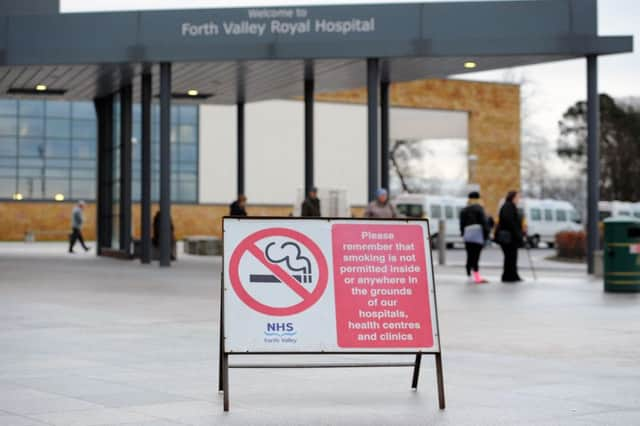Scots ‘oppose ban on smoking outside hospitals’


A greater number of people are against plans for a £1,000 fine for anyone caught breaching the ban.
The survey results come days after MSPs on Holyrood’s health committee voiced concerns about the proposal which will be enshrined in law.
Advertisement
Hide AdAdvertisement
Hide AdThe majority of those who took part either strongly disagreed or disagreed with the proposal (46 per cent and 16 per cent respectively) to ban smoking across all hospital grounds in Scotland.
More than half of respondents (54 per cent) strongly disagreed with imposing a fine of up to £1,000 on any person convicted of the offence of smoking in a no-smoking area in hospital grounds. More than two-thirds of those surveyed (68 per cent) either disagreed or strongly disagreed.
The objections were either due to suspicions that such a ban might include e-cigarettes or a more general objection to government measures that influence an individual’s behaviour, according to comments by those taking part. The report refers to this as the “nanny state” argument.
Maureen Watt, Minister of Public Health, said: “Smoke-free hospital grounds have been an ambition of this government for a number of years, and putting this on a statutory footing is an important step forward.
“Hospitals are places where people go for rest, recuperation and recovery, and it’s quite right that they should be smoke-free. I welcome all the hard work that has been put in by NHS boards around the country to lead by example and make this a reality.
“Tobacco remains the biggest cause of preventable death in Scotland, which is why we want to create a tobacco-free generation by 2034. Measures like smoke-free hospital grounds play their part in creating a culture change on tobacco, and discouraging people from taking up the habit in the first place.”
A total of 845 Scots participated in the survey, although the researchers say they may not necessarily be representative of the Scottish population as a whole.
An Ash Scotland and YouGov survey in March 2014 indicated that the majority, 73 per cent, of a representative sample of the Scottish population would be in favour of a ban on smoking in hospital grounds.
Advertisement
Hide AdAdvertisement
Hide AdThe proposal prompted concerns from Nationalist MSPs on the health committee who claimed it would infringe patients’ “human rights”.
Central Scotland MSP Richard Lyle suggested smokers should be allowed to smoke at a suitable distance from hospital entrances, such as 100 to 200 yards.
He suggested shelters could be set up in hospital grounds so people can “exercise their human right to do as they wish and have a cigarette.”
Fears were voiced that, on Scotland’s bigger hospital campuses, patients who smoke could face treks of up to a quarter of a mile and back to have a cigarette.
Highlands and Islands SNP MSP Mike MacKenzie suggested that the measure would effectively see some smokers forced to go “cold turkey” as it would leave many with a “real, practical problem” in being able to smoke.
Pro-smoking campaign group Forest branded the hospital smoking ban “vindictive and inhumane”.
But the survey shows that Scots are more supportive of Scottish Government plans to restrict the sale of nicotine vapour products, such as e-cigarettes, to under-18s.
More than 70 per cent are in favour of this and want retailers to be required to verify the age of those trying to buy e-cigarettes and tobacco products.
Most e-cigarette users are current or former smokers, many of whom use e-cigarettes in order to reduce their tobacco consumption, as they are safer to consume than tobacco products.